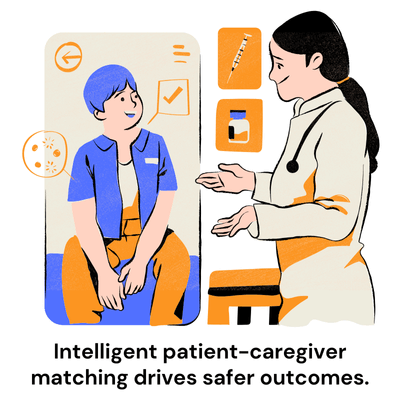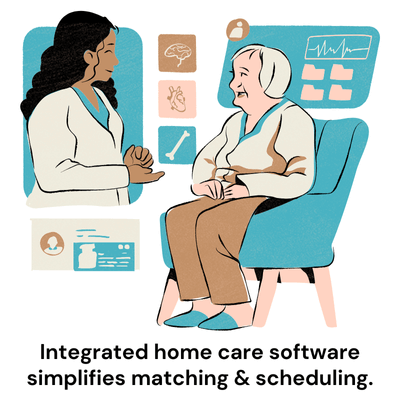Effective caregiver-patient matching improves satisfaction, reduces caregiver turnover, and strengthens continuity of care. Leveraging technology ensures patient-centered care and better outcomes at scale.
Introduction
Finding the right caregiver for a home care patient is more than just filling a shift. It’s about building trust, comfort, and continuity. Yet many agencies still rely on outdated, one-size-fits-all approaches that overlook personal preferences or real-time availability. This mismatch can lead to patient dissatisfaction, high caregiver turnover, and inconsistent care delivery.
When preferences like language, cultural background, and caregiver personality are aligned and schedules are coordinated effectively, patient engagement and care outcomes improve dramatically. Families gain peace of mind, caregivers feel more connected to their work, and agencies see better retention and satisfaction rates.
Fortunately, modern home care scheduling software solutions are making this process easier and more accurate. By leveraging technology to manage caregiver profiles, availability, and patient preferences, agencies can streamline matching decisions and deliver truly patient-centered care, tailored to each individual’s unique needs. In this article, we’ll explore how to make caregiver-patient matching smarter, smoother, and more effective.
Why Caregiver-Patient Matching Matters
Personalized caregiver-patient matching isn’t just beneficial. It’s essential for delivering high-quality, safe, and compassionate home care. Research underscores the benefits of thoughtful matching across multiple dimensions.
Impact on Patient Satisfaction and Trust
Patient satisfaction with home care varies widely, ranging between 30% and 84% in different studies, suggesting significant room for improvement in personalization and alignment with patient preferences (PMC). When caregivers share language, cultural background, or personality traits that resonate with patients, trust deepens and adherence to care plans improves. Strong caregiver compatibility helps patients feel comfortable and respected, which further enhances engagement and satisfaction. Building trust depends on maintaining quality of personal care services that respect each patient’s unique needs.
Reduced Caregiver Turnover
The home care industry continues to grapple with high turnover. Median annual rates hover near 80% in 2024, with nearly four in five caregivers leaving within their first 100 days (Home Care Association of America, PHI). By matching caregivers to clients based on both qualifications and personal fit, agencies can reduce stress, improve job satisfaction, and help stabilize their workforce. Skills-based assignments, such as dementia care, highlight why dementia and Alzheimer training matters to caregivers and improves compatibility.
Improved Continuity of Care in Home Care and Clinical Outcomes
Continuity of care in home care, or consistently assigning the same caregiver, can significantly lower short-term hospital readmission risk. One meta-analysis showed readmission rates dropped from 16% to 12.9% within one month when continuity interventions were employed (PubMed). Another study focused on physical therapy in home health settings found higher continuity correlated with a notable reduction in re-admissions (odds ratio ≈ 0.74, or a 4.3% absolute decrease) (Rutgers University). These outcomes reinforce the critical role of consistent caregiver-patient pairing.
Enhanced Family Confidence in Agency Services
While direct data is less common, surveys capturing patients’ and caregivers’ perceptions show overwhelmingly positive levels of satisfaction often above 88% with high-quality, well-coordinated home care services (Wiley Online Library). When a caregiver consistently meets both clinical and emotional needs, families feel assured, leading to stronger trust in the agency, longer engagements, and referrals.
In summary, effective caregiver-patient matching strengthens trust, boosts satisfaction, drives better clinical outcomes, and strengthens operational stability.
Challenges in Caregiver-Patient Matching
While matching caregivers to patients based on preferences and availability is essential for quality care, it comes with several operational and logistical challenges. Here are the most common issues home care agencies face:
Last-Minute Cancellations and Schedule Gaps
Even with well-planned schedules, unexpected caregiver cancellations can disrupt continuity of care and force agencies to make urgent substitutions. These last-minute changes rarely allow time for proper matching, often leading to dissatisfaction for both the patient and the replacement caregiver. One proven way of reducing caregiver no-shows with home care scheduling software is by using automated alerts and gap management tools.
Limited Caregiver Availability
The ongoing caregiver shortage in the home care industry means that agencies often struggle with home care staffing, making it difficult to find available staff, let alone the right match. This scarcity makes it difficult to honor patient preferences consistently, especially in rural areas or during peak times like holidays and weekends.
Balancing Patient Choice with Caregiver Workload
While honoring patient preferences is crucial, it must be balanced against caregiver availability and fairness in workload distribution. Continuously assigning high-demand caregivers to patients with specific needs can lead to burnout, dissatisfaction, and turnover within the caregiving team.
Technology Adoption Barriers in Smaller Agencies
Smaller home care agencies may lack the resources or technical expertise to adopt and implement caregiver-matching software. Manual scheduling methods, such as spreadsheets or whiteboards, limit visibility into real-time availability and make personalized matching difficult to scale or optimize.
Addressing these challenges requires a combination of smart scheduling practices, investment in the right technology, and operational flexibility. Doing so enables agencies to deliver more reliable, consistent, and person-centered care.
How Integrated Home Care Scheduling Software Simplifies Matching
Caregiver-patient matching is a nuanced process that becomes exponentially more complex when factoring in availability, qualifications, preferences, and continuity of care. CareVoyant’s Integrated Home Care Scheduling Software is built to streamline and simplify this process, helping agencies overcome the most pressing challenges in caregiver scheduling and matching.
Here’s how CareVoyant addresses these challenges with its robust features and intelligent automation:
Centralized Caregiver and Patient Profiles
At the core of effective matching is comprehensive, up-to-date information. CareVoyant provides a centralized platform that maintains detailed caregiver and patient profiles. Each caregiver profile includes licenses, certifications, special skills, availability, geographic preferences, and past assignment history. Patient profiles capture care requirements, visit history, language or cultural preferences, gender considerations, and more.
By consolidating this data, schedulers have full visibility into both sides of the match equation, allowing for more informed and personalized assignments without toggling between multiple systems or paper files. Agencies evaluating technology should look for must-have scheduling features that support real-time matching, compliance, and efficiency.
Real-Time Availability and Skill-Based Matching
CareVoyant’s dynamic scheduling engine ensures that only caregivers who are currently available and qualified are shown as matching options. The system considers real-time availability, travel distance, overlapping schedules, and clinical qualifications before recommending matches.
This capability minimizes scheduling errors, avoids manual cross-referencing, and dramatically reduces the risk of last-minute cancellations or double-bookings. It also supports proactive gap management by alerting agencies when open shifts are unassigned or when a cancellation impacts continuity.
Custom Rule Sets for Patient Preferences
Recognizing that each patient is unique, CareVoyant allows agencies to create custom rule sets to capture individual preferences whether it's a preferred caregiver, language spoken, or gender sensitivity. These preferences are factored into every scheduling decision, supporting the principles of patient-centered care.
This level of customization enhances patient satisfaction, builds stronger caregiver-patient relationships, and promotes trust in the agency’s ability to deliver person-centered care. The system can also remember prior successful matches and prioritize them when future visits are scheduled. Advanced scheduling systems support personalizing patient care with home care software, ensuring preferences are honored at every visit.
Integration with Visit Scheduling, Billing, and Care Plans
CareVoyant’s scheduling module is fully integrated with other critical areas of home care operations, including care planning, billing, and electronic visit verification (EVV). This unified system eliminates redundant data entry and ensures that scheduling decisions are always aligned with the patient’s care plan and payer requirements.
For example, a caregiver assigned to a skilled nursing visit must meet all payer-required qualifications. CareVoyant ensures compliance by automatically filtering available caregivers based on the specific care type and visit requirements. Once the visit is completed, the system seamlessly connects it to billing and payroll processes reducing administrative burden and increasing operational efficiency.
Reporting and Analytics to Track Match Quality
To continuously improve the matching process, CareVoyant offers powerful reporting and analytics tools that help agencies track caregiver utilization, patient satisfaction trends, visit completion rates, and schedule gaps. These insights allow administrators to identify patterns in cancellations, overbookings, or poor match outcomes and adjust staffing or workflows accordingly.
By monitoring KPIs related to match quality and schedule adherence, agencies can refine their staffing strategy, optimize caregiver assignments, and make data-driven improvements to patient care delivery.
Conclusion
Personalized caregiver-patient matching is no longer a luxury. It’s a necessity for delivering high-quality, patient-centered care in home care. When patients are paired with caregivers who align with their preferences, values, and care needs, the results speak for themselves: stronger relationships, improved satisfaction, better health outcomes, and greater trust in your agency’s services. By emphasizing caregiver compatibility, improving continuity of care in home care, and optimizing home care staffing strategies, agencies can strengthen both patient and caregiver experiences while ensuring long-term stability.
However, achieving this level of personalized matching at scale requires more than just good intentions, it requires the right tools. CareVoyant’s Integrated home care scheduling software makes it possible to match caregivers based on real-time availability, skills, and patient preferences while balancing caregiver workload and operational efficiency. With centralized profiles, automated scheduling, and real-time analytics, agencies can eliminate guesswork and streamline the matching process.
Now is the time for home care providers to evaluate how well their current matching process is working. Audit your workflows, identify gaps in caregiver-patient compatibility, and explore how smart scheduling solution can help you elevate care delivery and build long-term trust with your clients.
Frequently Asked Questions
-
Caregiver-patient matching is the process of pairing caregivers with patients based on skills, availability, and personal preferences to improve care quality and satisfaction.
-
Caregiver compatibility fosters trust, improves patient comfort, and enhances adherence to care plans — all of which contribute to better outcomes.
-
Patient-centered care ensures preferences such as language, cultural background, and caregiver personality are considered, leading to more personalized and effective care.
-
Consistent caregiver assignments reduce hospital readmissions, improve clinical outcomes, and strengthen long-term patient relationships.
-
Staffing shortages limit availability, making it harder to align caregivers with patient preferences and maintain continuity of care.
-
Home care Scheduling software automates matches based on skills, availability, and preferences, reducing errors, cancellations, and turnover.
-
Yes. When caregivers are paired with patients who fit their skills and personality, job satisfaction increases, reducing stress and turnover rates.
-
Key preferences include language, cultural background, gender, personality, and clinical needs — all of which influence comfort and trust.
-
Analytics track match success, satisfaction trends, and staffing gaps, helping agencies refine their caregiver assignment strategies.
-
CareVoyant’s integrated home care scheduling software centralizes caregiver and patient profiles, supports real-time matching, ensures compliance, and enhances patient-centered care delivery.
About CareVoyant
CareVoyant is a leading provider of cloud-based integrated enterprise-scale home health care software that can support all home-based services under ONE Software, ONE Patient, and ONE Employee, making it a Single System of Record. We support all home based services, including Home Care, Private Duty Nursing, Private Duty Non-Medical, Home and Community Based Services (HCBS), Home Health, Pediatric Home Care, and Outpatient Therapy at Home.
CareVoyant functions – Intake, Authorization Management, Scheduling, Clinical with Mobile options, eMAR/eTAR, Electronic Visit Verification (EVV), Billing/AR, Secure Messaging, Notification, Reporting, and Dashboards – streamline workflow, meet regulatory requirements, improve quality of care, optimize reimbursement, improve operational efficiency and agency bottom line.
For more information, please visit CareVoyant.com or call us at 1-888-463-6797.
Request for Information
To learn more about CareVoyant Software and how we improve the operational efficiency of Home Healthcare Agencies, contact us:







